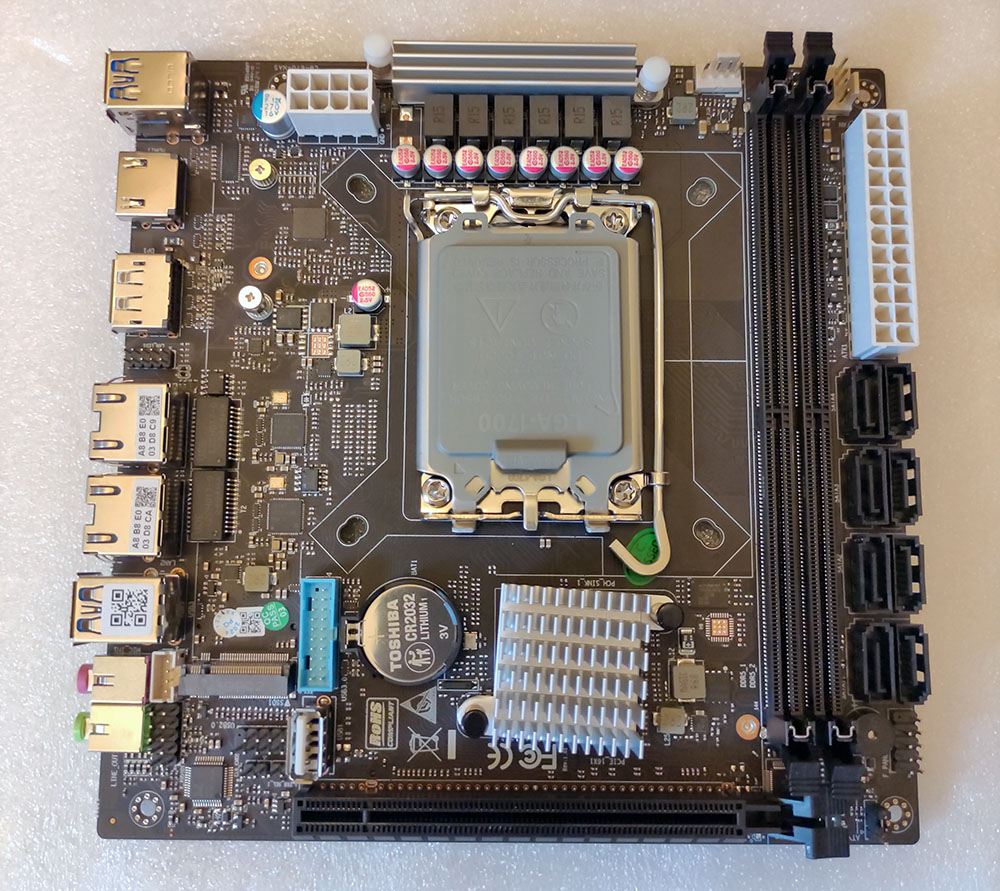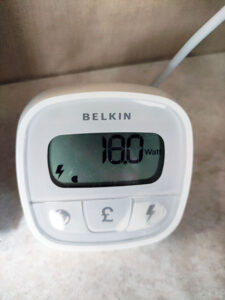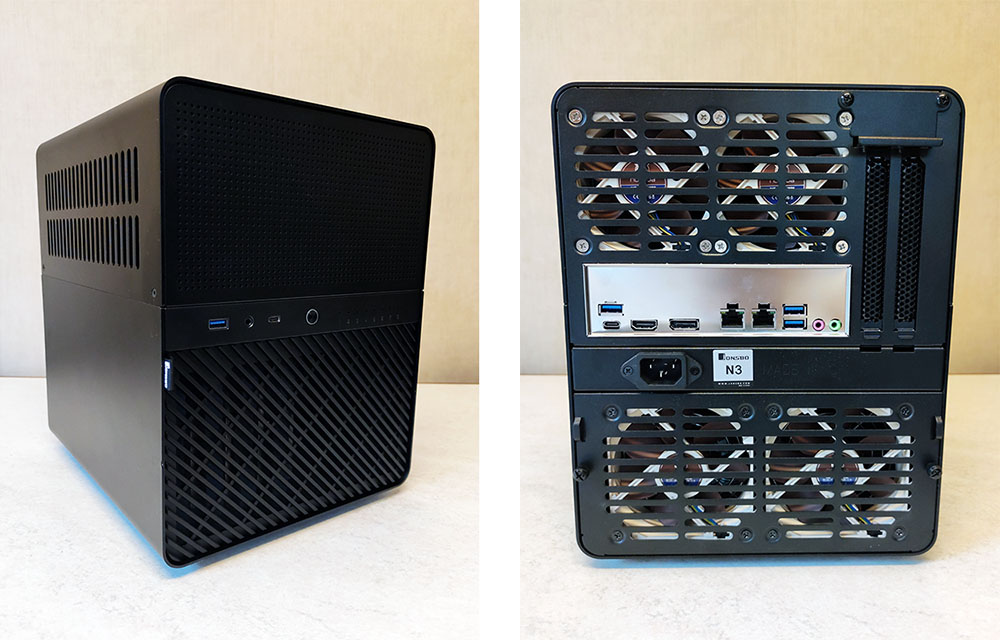The CWWK Q670 is certainly an interesting motherboard, especially if your goal is to build a low powered home NAS with up to 8x SATA hard drives.
In summery I can get my CWWK Q670 NAS build to idle at 18w, that is with 4x hard drives spun down and various Docker containers running an NVMe drive. That is with some tweaking however, so do read on if you are interested in why I chose the CWWK Q670, the hardware I used and the tweaks I did to get down to 18w at idle running UnRaid.
Firstly why the CWWK Q670?
The CWWK Q670 supports 8x SATA hard drives natively via the Alder Lake-S PCH SATA Controller on the Intel 600 Series Chipset. In short this is ideal as this SATA controller supports ASPM, meaning we should be able to significantly reduce power usage when our NAS is idle and the hard drives are spun down. In addition we also do not need to use a PCI-E SATA controller to use all 8x drive bays, which would increase power consumption.
Other cheaper Intel 11th or 12th Gen “NAS Motherboards” from Topton, BKHD and CWWK seem to use the JMB585 SATA chipset, which does not support ASPM, while some variations of these boards do use the ASM166 SATA chipset which does support ASPM (with newer firmware) the firmware on these boards is often outdated, so ASPM is not functional regardless.
In addition not all the SATA ports are native to the ASM166 controller on some of these boards either, although they are quite a few similar variations of these boards, so I wouldn’t like to say for certain that is the case for all of them. The other problem I had with these cheaper boards is theirs only 6x SATA ports, so you have to increase power usage adding a PCI SATA controller to run the 8x drives my Jonsbo N3 case is capable of housing.
This is where I believe the CWWK Q670 NAS Motherboard comes in to its own, its a much higher quality motherboard that will allow me to populate all 8x drive bays in my Jonsbo N3 case using the native Intel SATA chipset, keeping the PCI Express port free for future expansion.
In addition the CWWK Q670 supports 3x M.2 NVMe drives, ideal for various Pool drives in UnRaid, such as to run Docker containers, VM’s or even as a cache drive.
Network wise we have 2x 2.5 GbE Intel i226 Nics, so I’m more than futureproofed if / when I upgrade my home network beyond 1GbE.
The Internal USB port is ideal for the USB drive UnRaid boots from, to keep things neat and tidy.
Hardware In my CWWK Q670 NAS Build:
As builds can vary quite significantly with the CWWK Q670 NAS motherboard I’ve listed the hardware in my build below so you can see what I’m running to get the power consumption I’m going to list below.
- Motherboard: CWWK Q670 (£180 delivered to the UK direct from CWWK)
- Processor: Intel i5-12500T (£75 on Ebay)
- RAM: Corsair Vengeance 32GB (2x16GB) 4800MHz DDR5 (CMK32GX5M2A4800C40) (£96 on CCL)
- SSD: Samsung 990 PRO 2TB NVMe M.2 SSD (£134 on Amazon UK, with £40 off code)
- HDD: 4x Toshiba Enterprise MG10 20TB Drives (£300 each on Amazon UK)
- PSU: Corsair SF750 750 Watt Fully Modular 80+ Platinium SFX PSU (£155 on Scan)
- Case: Jonsbo N3 (£161.47 inc 20% VAT and delivery on AliExpress)
CWWK Q670 NAS Motherboard Power Consumption:
So with the above hardware in mind below are some power consumption reading in various states:
- Idle: 18w – 4x hard drives spun down and various Docker containers running from the NVMe drive.
- Hard Drives Active: 36-37w – 4x hard drives spun up and various Docker containers running from the NVMe drive.
- Plex Transcoding Audio: 27-28w with 1x hard drive spun up.
- Plex Transcoding Audio and Video: 27-28w with 1x hard drive spun up, with occasional 1 second jumps to 40-41w.
- Prime95 with 4x hard drives spun down: 47-48w – Windows 11 VM with 6 cores / 12 threads running from the NVMe drive.
- Prime95 with 4x hard drives spun up: 66-67w – Windows 11 VM with 6 cores / 12 threads running from the NVMe drive.
To achieve the above power consumption keep in mind:
- ASPM and C States were enabled in the BIOS, these are disabled by default.
- Powertop has also been installed on UnRaid and everything has been manually tuned, with the exception of the two Intel i226 Nics. To manually tune run “powertop” then go to the tunables tab via tab, using the arrow keys and spacebar to tune everything.
(The two Nics seem to have issues been tuned. The UnRaid Web UI will become inaccessible and the server will essentially crash as it will not be possible to do anything via the terminal with a keyboard connected, even though you can still type commands in to the local terminal.)
Reminder: If you reboot UnRaid you will have to manually tune again, I plan to look in to automating this when I have more free time. - Configure your BIOS as below to replicate my results
CWWK Q670 BIOS settings for low idle power consumption:
- CPU Settings > Advanced > C states = Enabled
- CPU Settings – Advanced > Package C State Limit = C10
- Chipset > PCI Express Configuration > PCI Express Root Port (For all of them 1, 2 ,3 and so on all the way down to 20+) > ASPM = L1 and L1 Substates = L1.1 and L1.2
- Chipset > PCI Express Configuration > PCI Express Root Port (For 1,2 and 3) > ASPM = L1
- Advanced -> Native ASPM = Enabled
- Advanced > ME State = Disabled
- CNVi Mode = Disabled
- Discrete Bluetooth Interface = Disabled
- HD Audio = Disabled
Keep in mind some cheap NVMe drives do not support ASPM, which could give you issues. Some NVMe also consume more power than others, so this is a bit of a minefield. As my NVMe drive is running my Docker containers its always active though. So its more active power consumption of the NVMe drive I’m concerned about.
Hopefully this blog post provides some useful insight in to the CWWK Q670 motherboard. I think this is a great Mini ITX motherboard for both a small and low powered home server / NAS build.
I purchased mine direct from CWWK who shipped very promptly, the motherboard arrived in the UK just over a week later.
Buy: CWWK Q670 8-bay NAS motherboard (not an affiliate link).





8 Comments
You can try putting network cable in both ports, then powertop should work with auto tune. Did you disable Intel management interface?
Hi there!
Did your board arrive with a user-manual?
I got mine installed in the case, but no clue which pin of the frontpanel-header is which… 🤷🏻♂️
I hope you can help me.
Kind regards from Austria.
Hey, I don’t believe any manual exists for this motherboard unfortunately.
However, I believe the front panel header is just the standard layout.
If you look at where the missing pin is in this image: https://matthewhill.uk/wp-content/uploads/2024/10/front-panel.jpg you can workout what is what when you look at the motherboard.
I hope you manage to get up and running!
I’ve recently installed this motherboard into a 3d printed NAS case (6x 3.5 & 2x 2.5 drives). After a bit of searching I found this manual: https://kdrive.infomaniak.com/app/share/1061285/985602a0-2c49-482a-a720-51da801f6c5d/preview/pdf/647
It’s identical to the CWWK board so is probably just a rebadged version.
Thanks for the info and link, I’ve mirrored the manual here in the event that link does not work in the future: https://matthewhill.uk/wp-content/uploads/2024/10/stonestorm-Q670-H670-manual.pdf
Not sure if it’s exactly the same mobo, but I followed the front panel header layout from this q670 manual and it worked for me: https://kdrive.infomaniak.com/app/share/1061285/985602a0-2c49-482a-a720-51da801f6c5d/preview/pdf/647
Why such a powerful PSU? Might you be able to reduce power usage with something half as powerful (or less)?
Looking at data from third parties that have tested the efficiency of PSU’s, the Corsair SF series ranked pretty much top of the pack. I did want to purchase the 450w version of this PSU, sadly it seemed to have been discontinued. I suspect I’m not actually drawing enough power on this build for the PSU to be running at absolute peak efficiency, so it might be possible for someone to get this build to draw even less power when idle with a different PSU.